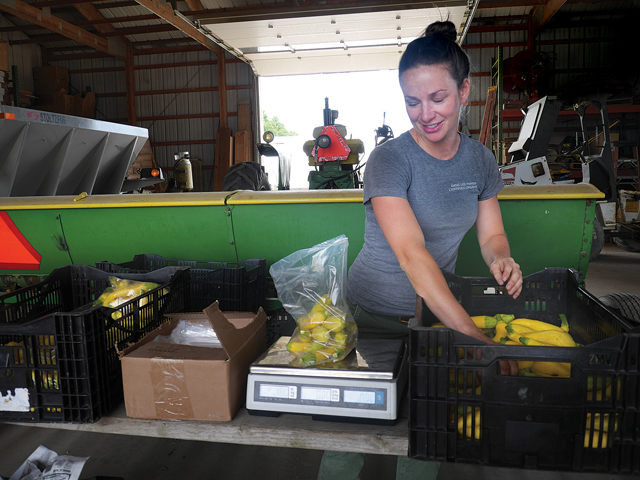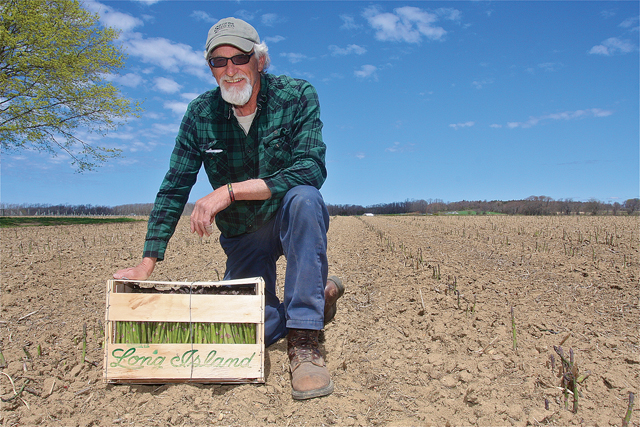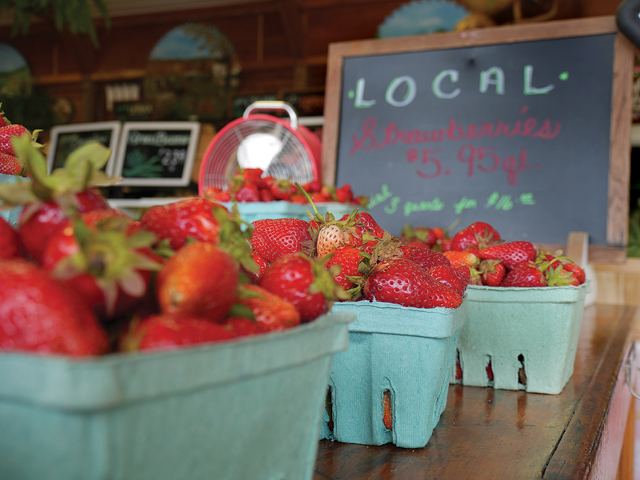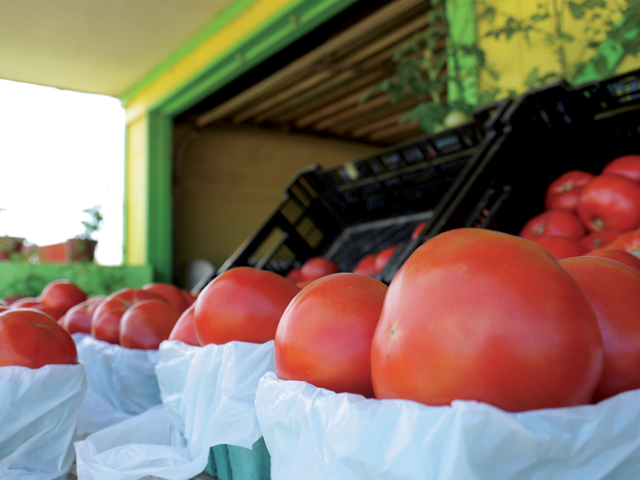A not-so-super option for farms as demand for ‘local’ produce grows


Have you ever walked down the produce aisle at your area supermarket, noticed a “buy local” sign and wondered exactly where the vegetables you were about to purchase were grown?
You’re not alone.
With demand for local produce on the rise, grocery chains across Long Island are more eager than ever to do business with North Fork farms. Currently, more than 20 farms from Wading River to Orient sell their goods wholesale to Long Island supermarkets.
But the practice isn’t in the cards for everyone. Some area farmers say they grow too little to sell wholesale; others can’t make the economics work or prefer traditional direct-to-consumer sales through farm stands or regional farmers markets.
So while some of the produce you see at grocery stores comes from area farms, it’s probably less than you might imagine. And despite the demand, not all growers are looking to get into the supermarket game.
Paulette Satur of Satur Farms in Cutchogue, which deals entirely in wholesale, said doing so wasn’t always her intention.
“It kind of mushroomed into this,” she said. “The grocery store is our farm stand.”
Ms. Satur and her husband, Eberhard Müller, started their farm 19 years ago to grow vegetables for the Manhattan restaurant Lutèce, where he was chef.
Today, Ms. Satur said, much of the produce grown on their 250-acre farm — mainly leafy vegetables and salad greens — would have a short shelf life on farm stands or at farmers markets. Instead, Satur Farms vegetables can be found at Whole Foods, Fresh Direct and Pret a Manger restaurants, among other places. The farm has the technology available to keep the vegetables refrigerated and fresh until they get to market.
In 2014, Satur Farms received a $120,000 state grant to expand its wholesale reach. That enabled the farm to buy additional equipment during the renovation and expansion of its Calverton warehouse. That expansion was necessary to meet wholesale demand, which Ms. Satur said varies each month but can amount to as many as 25,000 boxes a week.
“It’s a very difficult thing to work up your production and processing and food safety standards to the level that you need to be,” she said.

Long Island Farm Bureau administrative director Rob Carpenter said he believes wholesale farms on the East End struggle to keep up with competitive pricing because of all the restrictions New York farms face. These include the Food Safety Modernization Act and Good Agricultural Practice certification, both of which were designed to ensure that food is safe and that fair-practice standards, such as eliminating food contamination, are met.
Phil Schmitt of Schmitt’s Farm in Riverhead said his business wholesales herbs, lettuce and other vegetables, which are also sold at its Sound Avenue farm stand. Recently, Mr. Schmitt said, he has been thinking about scaling back his wholesale efforts despite the supermarkets’ increased interest in “buying local.” That’s due to the cost of farming on Long Island, the inability to match global market pricing and the impact regulations have had on his crops, he said.
Mr. Schmitt pointed specifically to regulations prohibiting the use of certain weed-killers, which have altered his business.
“Spinach used to be our biggest crop,” he said, adding that he once grew 75 acres but now produces just five due to weed-control regulations. “I cannot justify pulling the weeds by hand and there’s no profit left.”
Mr. Schmitt said that if he stepped away from the wholesale business and focused more on retail sales, he could reduce the number of acres he keeps in cultivation. He said that while selling directly to consumers is also competitive, doing more of it could help improve his profit margins. In fact, Mr. Schmitt said, he could get 50 percent more for his produce at a farm stand.
Lyle Wells of Wells Homestead Acres in Riverhead, which has been farmed by the same family for 12 generations, said he began wholesaling produce, including asparagus and zucchini, to supermarkets about a dozen years ago. However, he has also found it challenging and is thinking about scaling back.

Mr. Wells said his produce has been sold in several supermarkets, but that this year he is only supplying them with small amounts. He said one chain pulled out on him last summer during prime growing season because he didn’t want to comply with all the food-safety regulations, which are very costly for his small farm.
“It’s impossible for us to do,” he said. “It’s not only expensive, but it’s impossible.”
Lucy Senesac of Sang Lee Farms in Peconic said her farm is able to offer better prices by dealing directly with customers. Each week, Ms. Senesac and the Lee family sell their certified-organic produce at their Route 48 farm stand and three area farmers markets.
“There’s demand here, so for us that’s better, because with direct-to-consumer we can sell a vegetable for about what it costs to grow,” Ms. Senesac explained.
Before Sang Lee became an organic farm with a higher price point, Ms. Senesac said, it sold many of its Asian-style vegetables wholesale to markets in Chinatown and to Hunts Point Cooperative Market in the Bronx. Eventually, she said, those markets were able to purchase the same produce for less from other farms and Sang Lee began seeing much of its supply returned.
While Ms. Senesac said she is frequently asked if Sang Lee will ever begin selling its organic produce to area supermarkets, they don’t have the resources in place to return to such a business model.
Gene Wesnofske of Wesnofske Farms in Peconic said wholesale business is secondary to farm stand sales on his Route 48 property. In fact, he said, he really only wholesales surplus corn, peppers, cabbage and squash to Hunts Point Cooperative Market.
Mr. Wesnofske explained that when his family started the farm in 1967, it wholesaled its potatoes as far away as Puerto Rico. Now, however, the practice only accounts for around a quarter of the farm’s revenue.
Mickey Harley of Bhavana Blueberries in Southold began wholesaling his fruit to local IGAs and Uncle Giuseppe’s in 2015. This year, he hopes to add Stew Leonard’s to his client list. Unlike other farms that use distributors like J. Kings, Bhavana Blueberries deals with supermarkets directly, which adds an even greater challenge to the practice of wholesaling.
Last year, Mr. Harley said, IGA officials would call him when they needed blueberries and he would pick, pack and deliver them that same day.
“You lose that efficiency the distributor brings,” Mr. Harley said. “You’re biting a bullet on one hand, but hopefully receiving a higher price on the other hand.”

Mr. Carpenter said that if consumers really want Long Island fruits and vegetables they have to be willing to pay a higher price for them — even at the supermarket. He added that he hopes local grocery chains will advocate for East End farmers by featuring Long Island-grown sections.
“The grocery stores being part of the Long Island community should try and do more to encourage the purchase of locally grown [produce],” Mr. Carpenter said.
King Kullen was one of the first supermarket chains to carry local produce, starting around 18 years ago. While Mr. Carpenter said some grocery stores define “local” as anywhere within 100 miles, King Kullen specifically labels some of its produce as “Grown on Long Island.”
Rich Conger, director of produce for King Kullen, said that as demand increases, purchasing wholesale produce remains important to his locally owned grocery store chain.
“The Long Island consumer appreciates the fact that we are buying local,” he said.
Top Photo Caption: Farmer Lucy Senesac at Sang Lee Farms in Peconic. (Credit: Krysten Massa)








